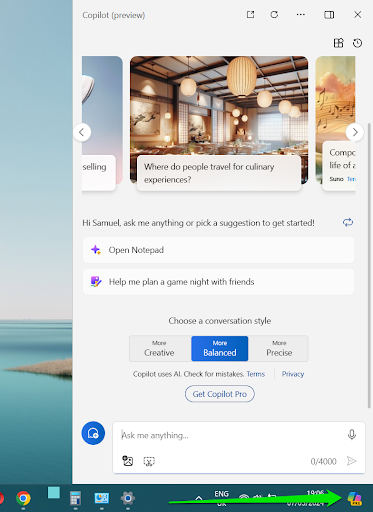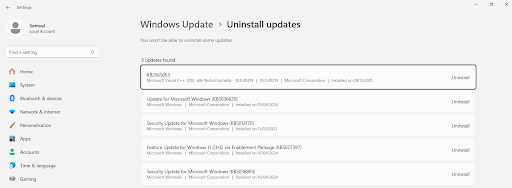Windows 11 users have enjoyed over two years of the operating system. However, whispers—and leaks—about a potential Windows 12 release made us look beyond the current OS for a while. While initial speculations hinted at a 2024 rollout, Microsoft seems to be shifting gears.
Rather than a brand new OS, Windows 11 will get a big update packed with features that would have formed the anticipated Windows 12.
In this article, we’ll go over everything we know about the rumored operating system, when we expect it to be released, and Microsoft’s plans for 2024.
What Do We Know About Windows 12?
As of the time of writing, Microsoft hasn’t officially confirmed that it is developing a new operating system or considering a release in the near future. However, leaks, speculations, and comments from industry executives and insiders, especially towards the end of 2023, suggested looking forward to a late 2024 rollout.
Events that triggered widespread expectations include:
- Microsoft’s move to one annual feature-rich update for Windows 11
- Qualcomm’s CEO’s prediction during an earnings call in January 2024 that the company’s new chips will work well with Windows’ “next version.”
- Intel’s Chief Financial Officer’s pronouncement during a Citi interview about increased sales due to a “Windows refresh.”
- Leaked unique desktop interface from Microsoft’s Ignite conference.
To be clear, none of the executives mentioned above directly declared the emergence of Windows 12. However, mentions of a “new Windows version” and the need for a “Windows refresh” were enough to raise expectations.
Those expectations are looking less likely as we approach 2024’s third quarter. Microsoft has also poured cold water on those rumors by announcing Windows 11 24H2 as this year’s annual feature update.
Why Is Microsoft Pushing the Windows 12 Release Date?
As mentioned, Microsoft is still yet to confirm that Windows 12 is being developed, despite the increasing speculations. However, the consensus is that the company is sticking with Windows 11 for now and releasing major updates annually, like it did with Windows 10.
Microsoft must have withdrawn its Windows 12 ambitions because it feels it’s not the right time to move on from Windows 11. The fact that support ends for Windows 10 in 2025 may have also been a factor.
Additionally, Windows 10 is still the dominant Windows operating system, with about 68% still using the platform. Microsoft may be waiting for more people to move over to Windows 11 before releasing the next OS.
Moreover, Windows 11’s new version may just be Microsoft’s testing ground for all the ambitious features it looks to release in Windows 12.
When Will Windows 12 Come Out?
There are still no official indications that Microsoft is developing Windows 12. While there are rumors that we may see Windows 12 in 2025, the release year is still not set in stone.
The company may want to continue improving Windows 11 to make it compatible with new chips, such as ARM processors, before shipping a more stable Windows 12.
You can read our piece on the timeline for every Windows version to learn more about the operating system’s evolution.
What to Expect on Windows 12
Many experts believe that Windows 11 24H2 is a prelude to Windows 12. So, we’ll see a lot of the anticipated features, or versions of them, this year.
These include AI and machine learning capabilities, updated UI features, and security improvements. Windows 12 will then expand on those features.
- More AI integration
Microsoft’s introduction of a Copilot preview in the Windows 11 23H2 update suggests a similar and expanded use of AI in the upcoming update and Windows 12.

There will be other applications for everyday tasks. A March 2023 Windows Insider blog post revealed a new “Recommended” feature in File Explorer for Windows 11. While it targets Active Directory users, it may potentially roll out to every Windows 12 user signed into OneDrive. The feature will leverage AI to show people relevant file contents and helpful suggestions.
A voice-activated evolution of Copilot could also offer hands-free convenience, surpassing Cortana. AI that anticipates user needs could also be a powerful addition to Windows 12, though I reckon that Microsoft will be careful to avoid access that may look intrusive.
Also Read: AI and Beyond: Emerging Technology in Software
- Arm processor support
Windows’ past performance on non-Intel and AMD PCs hasn’t matched the impressive Apple Silicon M series chips. However, there’s exciting potential for change with the 24H2 update and Windows 12.
Qualcomm’s executives claim their new Snapdragon X Elite PC processor boasts significant speed advantages over Apple, AMD, and Intel chips. They also come with NPUs (Neural Processing Units) that will boost the AI capabilities Windows now leverages with Copilot.
Hardware is only part of the equation; Windows and its apps need optimization for Arm-based chips. Past performance has been a challenge, but the hope is that this time will be different. If Microsoft can deliver, users can finally enjoy better battery life, thinner and lighter form factors due to energy efficiency, and built-in cellular connectivity.
- General changes and improvements
Windows 12 will no doubt be an upgrade to Windows 11 when we finally see it. However, we do not know how many changes will be introduced. But we can still speculate on significant appearance and feature upgrades, just like the shift from Windows 10 to 11.
Also read the full overview of differences between Windows 11 and Windows 10.
The installation interface, File Explorer, Quick Settings, and Taskbar are expected to see changes in Windows 11 24H2. We also expect these areas to experience significant improvement in Windows 12.
Some built-in programs, such as Maps, People, Mail, and Cortana, may also be phased out by the time Windows 12 gets here. Additionally, we should witness support for high file transfer speeds, as version 24H2 will now support USB4 storage.
- System requirement changes
Microsoft’s strict system requirements for Windows 11 left many Windows 10 users unable to upgrade, which may explain why adoption has been slower than Microsoft expected.
Windows 12 could raise the bar even higher, likely requiring the same TPM (Trusted Platform Module) chip and potentially 8GB of RAM. With Microsoft’s increasing focus on AI, Windows 12 might even include requirements for specialized hardware like NPUs.
Windows 11 vs. Windows 12
With Windows 11 24H2 around the corner, let’s cover the areas where the new update and Windows 12 will be similar and different.
Artificial intelligence
Microsoft introduced Copilot to Windows 11 23H2, with more AI features and integrations coming in version 24H2. Windows 12 is likely to push these components much further.
Unlike 24H2, we will likely see a more proactive operating system that learns from usage patterns. It could offer smart suggestions, help users automate tasks, and potentially feature a much more capable conversational AI assistant that supports voice commands.
Updated user interface
Microsoft briefly showcased a potentially new Windows interface during its Ignite conference in 2022. It featured a floating taskbar, redesigned top corners, and a centered search bar. While this brief display doesn’t guarantee the final Windows 11 version 24H2 or Windows 12 design, it hints at a continued focus on streamlining the user experience. We can expect Windows 12 to introduce UI changes, whether subtle or significant, that improve upon the new introductions in this fall’s updates.
Modular OS
Microsoft scrapped its ambition of making modular versions of Windows 10 (Windows 10x).
However, there are rumors suggesting Windows 12 may embrace a more modular structure. This means core components of the OS could update independently, similar to how some smartphone apps work. This change could lead to faster security patches and feature rollouts without the need for major OS upgrades.
There are no indications yet that the upcoming Windows 11 update will reintroduce modular versions of the OS, which will mark a significant difference between the two.
Control Panel changes
Microsoft has been gradually deprecating Control Panel since Windows 8, especially after it moved Windows Update to the Settings app. Windows 11 currently redirects users to the Settings app for different adjustments, such as when users click Devices and Printers and try to view installed updates.

While Windows 11 24H2 will not completely remove the panel, we expect Microsoft to limit it even more, if not a full withdrawal, in Windows 12.
When Will Windows 12 Be Released? Stay Updated
As mentioned, Microsoft is holding its cards close to its chest when it comes to Windows 12. While nothing has been confirmed, there are clear indications that we may see the new OS in the near future. We’ll continue to update you about what’s new in Windows 11 and Microsoft’s other plans.
You can subscribe to our newsletter to get prompt updates about Windows’ new releases.
Please head to the comments section to tell us what you think about Windows 12 and November’s Windows 11 update.



